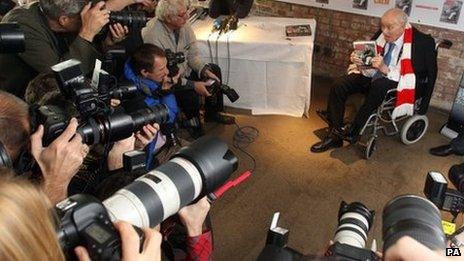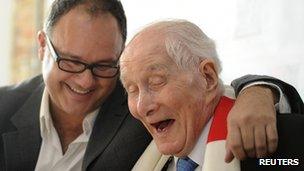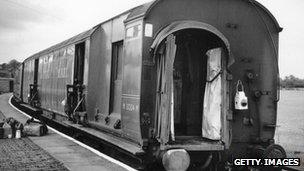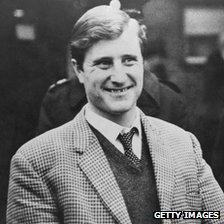Ronnie Biggs: Who was the real Biggs?
- Published

Ronnie Biggs was jailed for 30 years for his part in the Great Train Robbery but later escaped from prison and went on the run for 35 years
Ronnie Biggs, who has died aged 84, made a rare public appearance in 2011 and said he thought the public saw him as a "loveable rogue", not a criminal.
"It is the British press that made the 'legend' that you see before you, so perhaps I should ask you who I am."
So said an ailing 82-year-old Ronnie Biggs in a rare public appearance as he turned the tables on the journalists who have spent much of the past 48 years following and scrutinising him.
Biggs's part in the 1963 Great Train Robbery - in which a gang held up a mail train, making off with £2.6m - and his later escape from prison that sparked a global chase gave him a notoriety that has enthralled the press for nearly half a century.
His life as a criminal on the run filled many newspaper column inches over the decades, as did his return to Britain in 2001 to face justice, his return to prison and then the controversial decision to release him on health grounds in 2009.
At that time, his family argued he was severely ill with pneumonia and unlikely to recover. "Ronnie Biggs is about to close this last chapter. He will now be retreating fully from public life," his son Michael said at the time.

Biggs's son Michael's birth prevented his extradition from Brazil back to the UK
Yet, two years on, he was the focus of media attention again as he launched an updated version of his autobiography at a private members' club in Shoreditch, east London.
After all this time, how does he think the British public sees him?
Speaking with the help of his son Michael, because several strokes dictate that he can no longer speak, he denied that their view was of him as a criminal.
"I'm a loveable rogue," said Biggs by pointing to letters on a specially made poster.
Earlier, journalists awaited Biggs's arrival in a bright, upstairs room at Shoreditch House, to a soundtrack of Elvis's Jailhouse Rock and Thin Lizzy's Jailbreak, and the babble of Cockney accents.
When Biggs finally came in - nearly an hour late - his entrance was something akin to that of a rock star.
Wearing black sunglasses and skull and crossbones braces with a sharp black suit and blue tie, Biggs lapped up the attention as photographers closed in on his wheelchair.

The gang made off with £2.6m in used bank notes - a record haul at that time
"Ronnie, this way, Ronnie," they shouted. "In the middle Ronnie - gis' a wave Ron, thumbs up Ron."
As a frail Biggs responded to the requests, a smile creeping across his face, his son joked: "He'll be up tap dancing next."
Opening with a statement read by his son, Biggs gave a tongue-in-cheek thank you to those attending from "far and wide", including Australia and Brazil, where he spent 13,068 days on the run.
He added: "I can't believe this is my first press conference in Britain, but it is, and I apologise for not holding one after I went over the wall from Wandsworth (referring to his escape from Wandsworth prison in a furniture van after just 15 months behind bars)."
He explained how he would have liked to have had his own voice for the event, but added: "Despite my appearances my marbles are all there - or as many as I should have at my age and given my health."
He was quizzed on the actions that led to his notoriety and asked whether he wished he could go back and do things differently.
Did he regret the events of 8 August 1963? He answered "Yes" on his pad. If you could go back in time would you do it all again? A firm shake of the head. "No."
Did he feel uncomfortable in any way that the book was ultimately profiting from crime?
Biggs's son responded: "This is not profiting from crime this is profiting from his life. Yes he committed the crime but there's much more to my dad's life than the Great Train Robbery."
However, his son acknowledged that without the robbery Biggs would never have had the sometimes glamorous and exciting life he had. Instead he would likely have continued as a builder in Redhill.
Michael went on: "I don't look up to my dad as the Great Train Robber or as a criminal, I look up to him as the family man he became."
He said it was "never my father's intention to become Ronnie Biggs". Biggs had no way to support himself in Brazil so the press became his way to survive, he said.
"My dad was probably the Jordan of the 80s," quipped Michael, whose birth prevented his father's extradition from Brazil back to the UK.
One name that cropped up time and time again was that of Jack Mills.
He was the train driver caught up in the robbery. He was badly beaten by some of the gang and never recovered. He died in 1970 of leukaemia.
Asked if any of the proceeds from the book could go to his family, Biggs's son responded: "We haven't discussed that yet but it could be a possibility."
His family said the book - named Odd Man Out: The Last Straw - was a chance for Biggs to answer the "many misconceptions" about the robbery.
He has been working on the book since his release from jail in 2009.
Michael Biggs believes his father has been wrongly blamed for the violent actions of others. In fact, the man who Biggs claims coshed Mr Mills has never been caught. The convicted gang members still refuse to give him up, and he remains one of three robbers never caught.
Michael added: "My father wants to set the record straight (with the book). This is his last press appearance. He's retiring from public life 100%."
His son described the state of his father's health and how he developed chest infections every three or four weeks.

Biggs was arrested in March 1964
He also has no control over his mouth and throat, he said.
He said Biggs, who is originally from Lambeth, south London, had a final wish that his ashes be spread between Brazil and London.
But why is it that the Great Train Robber still holds such fascination now, nearly half a century on from his crime?
Daily Mail journalist David Jones, who has followed the former fugitive's story for years and met him in Rio in 2000, thinks he has the answer.
"He's the one who cocked a snook and pulled the wool over the authorities' eyes. Everybody likes to think they could do the same," he grins.
"They see him as a loveable rogue - and they're three-quarters right."
- Published18 December 2013